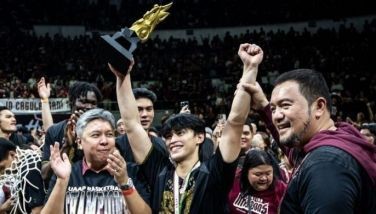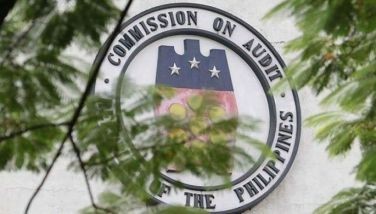Sisyphean struggle

May 2, 2002 | 12:00am
The title of my column for today is based on a mythical character in Greco-Romano mythology called Sisyphus. He was said to be a cruel king from Corinth whose punishment in the Hades was to roll up a hill a heavy stone that rolls down again and again. So the word sisyphean relates to seemingly futile endeavors. That could well describe the effort to change the 1987 Philippine Constitution. So why bother, why persist in the effort if it is futile?
For my part, it is because there is a small window of hope. It has to do with what I would like to believe is the difference between the myth of Sisyphus and the crusade of Filipinos who regard change in the Constitution as a way out of the country’s political dilemma. In Sisyphus’ case, rolling a stone uphill again and again was a punishment. I like to believe that in the case of the Philippines, the effort to change the 1987 Constitution is a test, a challenge rather than a punishment.
As one reader pointed out to me once, the Philippines is a young country and having been colonized for many years, it never really quite got hold of itself to forge a truly independent nation. It was the way things were, during the time of the Spanish domination and in the American as well. There was a short period from 1946 to the present time when we should have learned the ropes of what it takes to govern and be governed well. There was an unfortunate lacunae of the Marcos years that experimented with authoritarianism and held back our development as a democratic nation. And now we are thrust into globalization. We have had to catch up with the rest of the world without having passed through a period of self-sufficient stability that would have allowed us more ease in adapting.
It would be presumptuous to imagine that the problems of nationhood spawned by that time lag could be solved instantly. The experience can be nerve-wracking and confusing, driving us to point at each other needlessly. In the campaign to change the 1987 Constitution as the vehicle for drastic political reforms to bring us out the rut of our unfortunate history, the key is to be single-minded. We must keep focused on the issues and not be derailed by personal or political animosities that are, after all, the consequences of that colonial past. Maybe it is not quite accurate to say that what we are about is to change the 1987 Constitution. The task goes beyond that. In a profound way it will be the first time that we will be writing a constitution for and by ourselves.
A unique opportunity. Apart from the Movement for a Federal Philippines which is academe-based, three more groups have now declared themselves publicly for constitutional change. These are: a large group in Congress, senators and congressmen led by Speaker Jose de Venecia who has said that although they are for constitutional change, they would coordinate with President Macapagal-Arroyo who has publicly detached herself from the debate in the present time. Her position is that she wants to spend the time for her economic agenda. Then there is COPA, which recently came under fire for suggesting collective leadership to tackle the national crisis. More recently the Philippine Consultative Assembly, (PCA) in coalition with the Erap forces also joined the fray declaring that they are for a shift to a parliamentary federal system. What we have is a snapshot of a political scene with widely divergent political groups coming together on the issue of constitutional change. Except for the usual skeptics and hopelessly incorrigible who will insist this is not the time for constitutional change, I think that we are being presented with a unique opportunity to unify the country under the aegis of a new constitution.
Point of unity. Despite our differences what this growing consensus means is that there is a point of unity on which we can all agree after all — and that is to agree to change the design of our political institutions. I know that there is a view that insists there is nothing wrong with our institutions; what is wrong is our politicians, that they misuse these institutions. The implication is that we need to reform our politicians. This pervasive hostility between those who govern and those who are governed has caused a wide breach that has sometimes made governance impossible. There is a further suggestion that instead of revising the Constitution we should perhaps attack corruption that pervades the system of government. That is a view I can respect but I happen to disagree with. I belong to the school of thought that puts more blame on the structure through which we are governed. The clearest example of this anomaly is our electoral system. We elect a president on a one man, one vote principle with overwhelmingly ignorant masses unable to distinguish between a good public official and a popular actor. The tendency of our politics given the present system is for candidates to court popularity rather than efficiency or experience. Why should we blame actors and actresses for running for public office if the political game is popularity in a one man, one vote system?
The way forward —how to use the politicians. In the campaign for constitutional change, the way forward is to know how to use politicians. For the first time in many years, the politicians may need us more than we will ever need them to push for changes in the constitution. The need for the consent of their constituents will push them to a new relationship with the electorate and vice versa. The electorate can also wield their power by making sure that their inputs are carried out in elucidating just what kind of Constitution we ought to have in our shift towards parliamentary federal.
The red-letter days that will determine how the cooperative venture between ordinary citizens and politicians will be forged starts tomorrow at the Manila Hotel. There, instead of squabbling, we hope that the All Parties Conference organized by Speaker Jose de Venecia will be able to thrash out a national agenda for modernizing political institutions of a democractic and prosperous national community. I understand that the keynote speaker will be President Macapagal-Arroyo as the titular head of the Lakas-NUCD-UMDP. So will members of the opposition, Laban, Liberal, Nacionalista, and the Puwersa ng Masa, the academe and NGOs who have been part of the national drive to energize and reform our political institutions.
BrandSpace Articles
<
>
- Latest
- Trending
Trending
Latest
Trending
Latest
Recommended




























